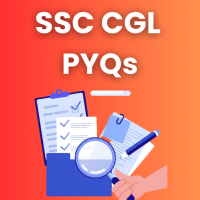SSC CGL Exam > SSC CGL Questions > Which of the following represents the correct...
Start Learning for Free
Which of the following represents the correct indirect speech for the direct sentence: "She said, 'I will go to the market tomorrow.'"?
- a)She said that she would go to the market the next day.
- b)She says she will go to the market the next day.
- c)She said that she will go to the market tomorrow.
- d)She says she would go to the market the next day.
Correct answer is option 'A'. Can you explain this answer?
Verified Answer
Which of the following represents the correct indirect speech for the ...
In the given direct sentence, "She said, 'I will go to the market tomorrow,'" when converting to indirect speech, the reporting verb changes to 'said' and the tense of the verb inside the quotation changes as well. In reported speech, 'will' changes to 'would' when expressing future events from the perspective of the past. Therefore, the correct indirect speech is "She said that she would go to the market the next day."
View all questions of this test
Most Upvoted Answer
Which of the following represents the correct indirect speech for the ...
Explanation:
Indirect speech is used to report what someone else has said without quoting their exact words. When converting direct speech to indirect speech, we need to make certain changes based on the context and tense of the original sentence. Let's break down the conversion of the given direct sentence into indirect speech:
Direct Sentence: She said, "I will go to the market tomorrow."
Indirect Speech: She said that she would go to the market the next day.
Explanation of the Conversion:
- Reporting verb: In indirect speech, the reporting verb "said" changes based on the tense of the reported sentence. In this case, "said" remains the same as it is in the past tense.
- Pronouns: The pronouns need to be changed based on the subject and context. In this sentence, "I" changes to "she" as we are reporting what someone else said.
- Verb Tense: The verb tense also changes when converting from direct to indirect speech. "Will go" changes to "would go" to reflect the shift from present tense to future in the past tense.
- Time and Place Expressions: In indirect speech, time and place expressions may need to be adjusted based on the context. "Tomorrow" changes to "the next day" to maintain the meaning in the reported speech.
Therefore, the correct conversion of the given direct sentence into indirect speech is: She said that she would go to the market the next day.

|
Explore Courses for SSC CGL exam
|

|
Question Description
Which of the following represents the correct indirect speech for the direct sentence: "She said, 'I will go to the market tomorrow.'"?a)She said that she would go to the market the next day.b)She says she will go to the market the next day.c)She said that she will go to the market tomorrow.d)She says she would go to the market the next day.Correct answer is option 'A'. Can you explain this answer? for SSC CGL 2025 is part of SSC CGL preparation. The Question and answers have been prepared according to the SSC CGL exam syllabus. Information about Which of the following represents the correct indirect speech for the direct sentence: "She said, 'I will go to the market tomorrow.'"?a)She said that she would go to the market the next day.b)She says she will go to the market the next day.c)She said that she will go to the market tomorrow.d)She says she would go to the market the next day.Correct answer is option 'A'. Can you explain this answer? covers all topics & solutions for SSC CGL 2025 Exam. Find important definitions, questions, meanings, examples, exercises and tests below for Which of the following represents the correct indirect speech for the direct sentence: "She said, 'I will go to the market tomorrow.'"?a)She said that she would go to the market the next day.b)She says she will go to the market the next day.c)She said that she will go to the market tomorrow.d)She says she would go to the market the next day.Correct answer is option 'A'. Can you explain this answer?.
Which of the following represents the correct indirect speech for the direct sentence: "She said, 'I will go to the market tomorrow.'"?a)She said that she would go to the market the next day.b)She says she will go to the market the next day.c)She said that she will go to the market tomorrow.d)She says she would go to the market the next day.Correct answer is option 'A'. Can you explain this answer? for SSC CGL 2025 is part of SSC CGL preparation. The Question and answers have been prepared according to the SSC CGL exam syllabus. Information about Which of the following represents the correct indirect speech for the direct sentence: "She said, 'I will go to the market tomorrow.'"?a)She said that she would go to the market the next day.b)She says she will go to the market the next day.c)She said that she will go to the market tomorrow.d)She says she would go to the market the next day.Correct answer is option 'A'. Can you explain this answer? covers all topics & solutions for SSC CGL 2025 Exam. Find important definitions, questions, meanings, examples, exercises and tests below for Which of the following represents the correct indirect speech for the direct sentence: "She said, 'I will go to the market tomorrow.'"?a)She said that she would go to the market the next day.b)She says she will go to the market the next day.c)She said that she will go to the market tomorrow.d)She says she would go to the market the next day.Correct answer is option 'A'. Can you explain this answer?.
Solutions for Which of the following represents the correct indirect speech for the direct sentence: "She said, 'I will go to the market tomorrow.'"?a)She said that she would go to the market the next day.b)She says she will go to the market the next day.c)She said that she will go to the market tomorrow.d)She says she would go to the market the next day.Correct answer is option 'A'. Can you explain this answer? in English & in Hindi are available as part of our courses for SSC CGL.
Download more important topics, notes, lectures and mock test series for SSC CGL Exam by signing up for free.
Here you can find the meaning of Which of the following represents the correct indirect speech for the direct sentence: "She said, 'I will go to the market tomorrow.'"?a)She said that she would go to the market the next day.b)She says she will go to the market the next day.c)She said that she will go to the market tomorrow.d)She says she would go to the market the next day.Correct answer is option 'A'. Can you explain this answer? defined & explained in the simplest way possible. Besides giving the explanation of
Which of the following represents the correct indirect speech for the direct sentence: "She said, 'I will go to the market tomorrow.'"?a)She said that she would go to the market the next day.b)She says she will go to the market the next day.c)She said that she will go to the market tomorrow.d)She says she would go to the market the next day.Correct answer is option 'A'. Can you explain this answer?, a detailed solution for Which of the following represents the correct indirect speech for the direct sentence: "She said, 'I will go to the market tomorrow.'"?a)She said that she would go to the market the next day.b)She says she will go to the market the next day.c)She said that she will go to the market tomorrow.d)She says she would go to the market the next day.Correct answer is option 'A'. Can you explain this answer? has been provided alongside types of Which of the following represents the correct indirect speech for the direct sentence: "She said, 'I will go to the market tomorrow.'"?a)She said that she would go to the market the next day.b)She says she will go to the market the next day.c)She said that she will go to the market tomorrow.d)She says she would go to the market the next day.Correct answer is option 'A'. Can you explain this answer? theory, EduRev gives you an
ample number of questions to practice Which of the following represents the correct indirect speech for the direct sentence: "She said, 'I will go to the market tomorrow.'"?a)She said that she would go to the market the next day.b)She says she will go to the market the next day.c)She said that she will go to the market tomorrow.d)She says she would go to the market the next day.Correct answer is option 'A'. Can you explain this answer? tests, examples and also practice SSC CGL tests.

|
Explore Courses for SSC CGL exam
|

|
Signup for Free!
Signup to see your scores go up within 7 days! Learn & Practice with 1000+ FREE Notes, Videos & Tests.


















